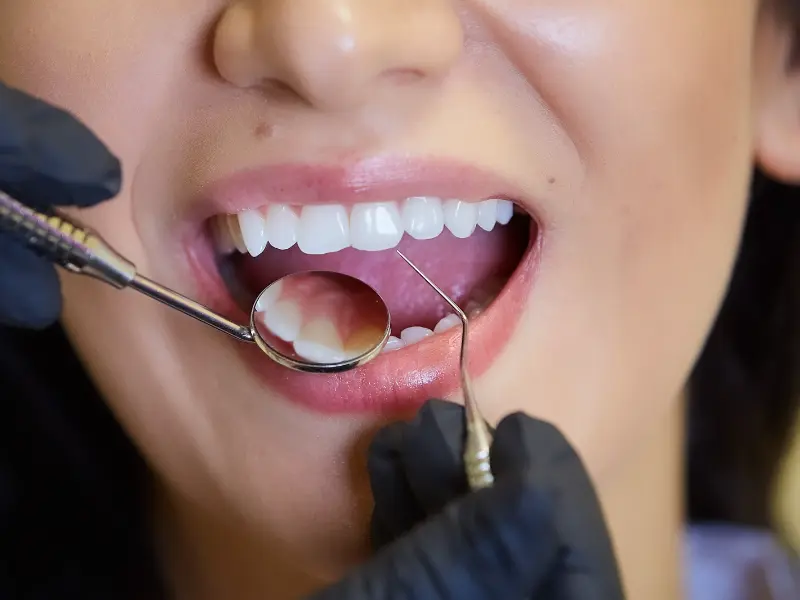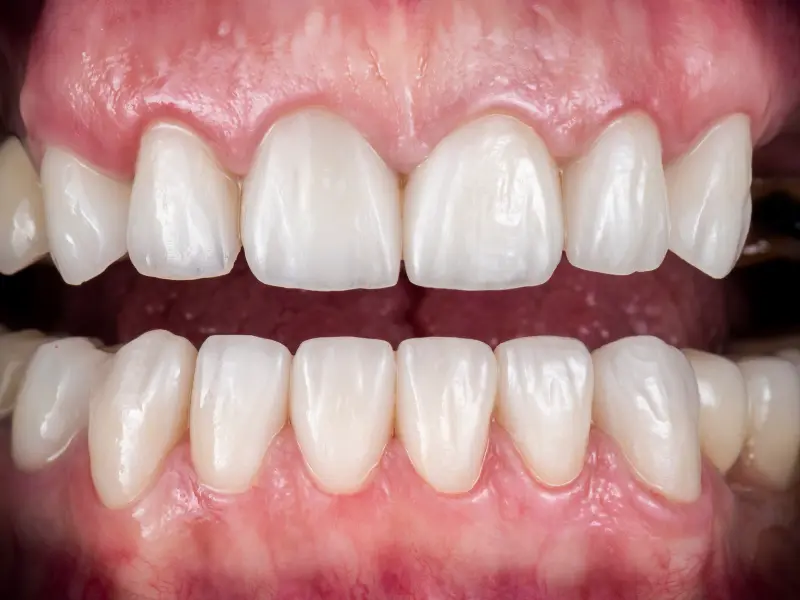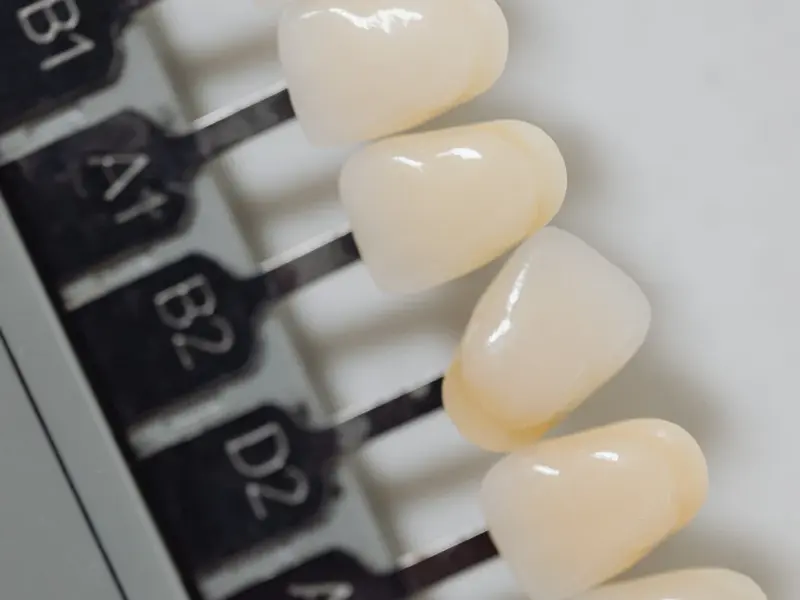Have you ever wondered what your teeth would look like under veneers? Veneers are a popular cosmetic dentistry option for people who want to improve the appearance of their teeth, but many are unsure of what their teeth will look like once they are covered with veneers. In this article, we will explore What Do Teeth Look Like Under Veneers, how veneers are made, and the pros and cons of getting veneers.
Table of Contents
Understanding Veneers
Before we delve into What Do Teeth Look Like Under Veneers, let’s first understand what veneers are. Veneers are thin shells of porcelain or composite resin that are bonded to the front of your teeth. They are custom-made to fit over your existing teeth and can be used to correct a variety of cosmetic issues such as stains, chips, gaps, and misalignments.
How Veneers are Made
Veneers are typically made in a dental lab, although some dentists have the technology to create them in-house. The process begins with your dentist taking impressions of your teeth, which are sent to the lab along with specific instructions on the desired shape, color, and size of the veneers. The lab then creates a model of your teeth and uses it to fabricate the veneers. Once the veneers are ready, your dentist will bond them to your teeth using a special adhesive.
What Do Teeth Look Like Under Veneers
Now that we understand what veneers are and how they are made, let’s get to the question at hand: What Do Teeth Look Like Under Veneers? The answer is that it depends on the condition of your natural teeth. If your teeth are in good condition with no significant discoloration or damage, they will likely look very natural under veneers. However, if your teeth have severe discoloration, damage, or decay, your dentist may need to do additional work to prepare your teeth for the veneers. This may include tooth whitening, filling cavities, or even extracting teeth in extreme cases.

Factors to consider before getting veneers
While veneers can provide a quick and effective solution for improving the appearance of your teeth, there are several factors to consider before getting them. First, you should be aware that veneers require the removal of a small amount of tooth enamel, which is a permanent process. Additionally, if you have underlying dental issues such as gum disease or tooth decay, these issues will need to be addressed before getting veneers.
Cost is another factor to consider, as veneers can be an expensive treatment. Depending on the material used and the number of teeth being treated, the cost of veneers can range from a few hundred to several thousand dollars. Finally, it’s important to have realistic expectations about what veneers can and cannot do for your teeth. While veneers can provide a dramatic improvement in the appearance of your smile, they are not a cure-all for all dental issues and may not be suitable for everyone.
The importance of choosing a qualified dentist
When considering getting veneers, it’s crucial to choose a qualified and experienced dentist who can help guide you through the process and ensure that you achieve the best possible results. Look for a dentist who has extensive training in cosmetic dentistry and who can provide before-and-after photos of previous patients who have undergone similar treatments.
Additionally, it’s important to ask questions and have open communication with your dentist throughout the process. Be sure to discuss any concerns or questions you have before the procedure so that you feel confident and informed. Finally, be wary of dentists who offer extremely low prices for veneers or who advertise “quick fix” solutions. While veneers can provide a great solution for many people, the process should still be approached with care and caution to ensure the best possible outcome.
Check This Out! Teeth Whitening Istanbul Cost: How to Get a Brighter Smile on a Budget
Pros and Cons of Veneers
While veneers can dramatically improve the appearance of your teeth, they are not without their drawbacks. Here are some of the pros and cons of getting veneers:

Pros:
- Veneers can correct a variety of cosmetic issues.
- They are custom-made to fit your teeth, ensuring a natural-looking result.
- Veneers are long-lasting, with a lifespan of 10-15 years with proper care.
- They are stain-resistant and easy to clean.
Cons:
- Veneers are expensive and can cost thousands of dollars per tooth.
- The process of getting veneers is irreversible, as a thin layer of enamel is removed from your teeth to make room for the veneers.
- Veneers can be fragile and may crack or chip if you bite down on something hard.
- They require regular maintenance and may need to be replaced over time.
How to care for veneers
After you have received your veneers, it’s important to take proper care of them to ensure they last as long as possible. This includes regular brushing and flossing, as well as avoiding hard or chewy foods that could damage your veneers. Your dentist may also recommend that you wear a nightguard to protect your veneers from grinding or clenching your teeth while you sleep.
It’s also important to attend regular checkups with your dentist to make sure your veneers are still in good condition and to address any issues that may arise. While veneers are durable, they can still be damaged or become loose over time. By following these tips, you can help ensure that your veneers stay in great shape and continue to give you a beautiful smile for years to come.
Check This Out! Can You Brush Veneers Once a Day? A Comprehensive Guide
Alternatives to veneers
While veneers can be a great option for improving the appearance of your teeth, they may not be the right choice for everyone. There are several alternatives to veneers that you may want to consider, including teeth whitening, orthodontic treatment, and dental bonding. Teeth whitening can help brighten your natural teeth without the need for veneers, while orthodontic treatment can help straighten your teeth if that is your main concern. Dental bonding is another option that involves applying a tooth-colored resin to the surface of your teeth to improve their appearance.
Your dentist can help you determine which option is right for you based on your individual needs and goals. Keep in mind that each option has its own advantages and disadvantages, so it’s important to discuss all of your options with your dentist before making a decision. Whether you choose veneers or another treatment, the most important thing is that you feel confident and happy with your smile.

Cost and affordability
The cost of veneers can vary depending on a number of factors, including the type of veneers you choose, the number of teeth being treated, and the location of the dental practice. In general, veneers can be a relatively expensive cosmetic dental procedure, with costs ranging from several hundred to several thousand dollars per tooth.
While the cost of veneers may be a deterrent for some people, it’s important to remember that there are often financing options available to help make the procedure more affordable. Additionally, many dental insurance plans may cover at least a portion of the cost of veneers if they are deemed medically necessary to improve the health or function of your teeth. By talking to your dentist and exploring your options, you may be able to find a way to make veneers more accessible and affordable for you.
FAQs about What Do Teeth Look Like Under Veneers
- Are veneers painful to get?
- No, getting veneers is not painful. However, your dentist may need to remove a thin layer of enamel from your teeth, which may cause some sensitivity.
- How long do veneers last?
- Veneers can last up to 10-15 years with proper care, but may need to be replaced over time.
- Can veneers be whitened?
- No, veneers cannot be whitened once they are in place. However, your natural teeth can be whitened to match the shade of your veneers.
- Do veneers feel different from natural teeth?
- Veneers may feel slightly different from natural teeth, especially in the first few days after they are placed. However, most people adjust to the feeling quickly and find that veneers feel very natural.
- Can veneers be removed?
- Yes, veneers can be removed, but the process is irreversible and may require additional dental work to restore your natural teeth.
Overall, getting veneers can be a great option for those who want to improve the appearance of their teeth. While it’s important to understand the pros and cons and What Do Teeth Look Like Under Veneers, many people find that the benefits outweigh the drawbacks. Talk to your dentist to see if veneers are right for you and to discuss your options for achieving the smile you’ve always wanted.
Conclusion of What Do Teeth Look Like Under Veneers
In conclusion, veneers are a popular cosmetic dentistry option that can dramatically improve the appearance of your teeth. While they are not suitable for everyone and come with their own set of pros and cons, they can be a great option for those who want to achieve a brighter, more uniform smile. If you’re considering veneers, talk to your dentist to see if they are right for you.





No comment